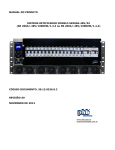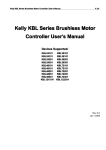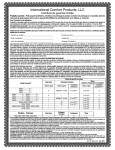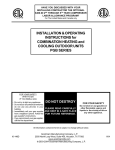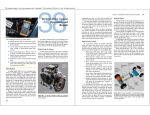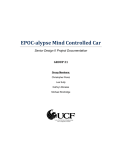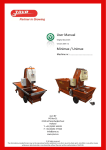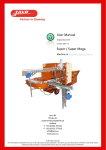Download Hybrid Go-Kart
Transcript
Hybrid Go-Kart Igor Mierzvinski • Andrew Langsdon • Phil Walters October 17, 2008 Faculty Advisor: Dr. Khalid S. Al-Olimat Executive Summary The goal of the project is to design a hybrid go-kart. A hybrid go-kart will allow for luxuries such as increased gas mileage, automatic recharging of batteries, less pollution, and quieter operation. It has been decided that an electric motor will be used in unison with a currently installed gasoline engine. The decision to design a hybrid go-kart took much time to resolve. Originally the decision was thought to be made by AEP. After communicating and discussing the matter, it became clear the decision was up to our group. After researching different points of the project, and visiting a similar project at the University of Toledo, it was finally decided that we would design and build an electric-gas hybrid go-kart. The basic system of the go-kart will work as follows. The electric motor will be powered by batteries. When these batteries lose their power, the gas engine will be activated and will be used to propel the go-kart, and also charge the batteries. The batteries will be charged by using the electric motor as a generator whose shaft is rotated by the gas engine. Once the batteries contain enough power to sustain propulsion of the go-kart, the gasoline engine will be deactivated and the electric motor will be reactivated. There have been several hardware decisions made that greatly impact the overall cost of the project. These include items such as the DC motor, the batteries, and the electric starter for the engine. A summary of these items and why they were chosen can be found in the following report. Their associated costs can also be seen in the budget table. The main problem of the project will be to design a working prototype that is able to easily switch between the electric motor and the gasoline engine. If a prototype is built that meets this requirement, the project can be considered a success. With this knowledge, other companies can use the project and our findings to benefit in manufacturing on a large scale. There are many benefits from using a hybrid go-kart. For example, the hybrid go-kart can be used as a model if a person wanted to convert their automobile to a hybrid. It would essentially be very similar to this project, except on a larger scale. The go-kart will be designed to be used in various applications. Some of these applications will include transportation between buildings outside, quick transportation for inside a warehouse, or for racing applications. The following report has details about the entire project that is being proposed. While many decisions have been made and are final, some smaller details will still change. However, we feel that the report is a good representation of how the final prototype will be designed, and the amount it will cost. ii Table of Contents Executive Summary....................................................................................................................................... ii Table of Contents ......................................................................................................................................... iii Problem Statement ....................................................................................................................................... 4 Operational Description ................................................................................................................................ 5 System Specifications.................................................................................................................................... 6 Design Deliverables ....................................................................................................................................... 7 Preliminary Test Plan .................................................................................................................................... 8 Implementation Considerations ................................................................................................................... 9 System Design ............................................................................................................................................. 10 Alternative Designs ..................................................................................................................................... 12 Constraints .................................................................................................................................................. 15 Budget Appropriations ................................................................................................................................ 17 Conclusion ................................................................................................................................................... 19 Appendices.................................................................................................................................................. 20 Appendix A – Operational Description ................................................................................................... 21 Appendix B – Gantt Chart ....................................................................................................................... 23 Appendix C – Electric Motor Dimensions ............................................................................................... 24 Appendix D – Electric Motor Data .......................................................................................................... 25 Appendix E – RPM Test Data ................................................................................................................... 26 Appendix F – Bibliography ...................................................................................................................... 27 iii Problem Statement Although most motor vehicles are powered by gasoline engines, this is not the only option. There are several types of alternative fuel-powered cars including ethanol, hydrogen fuel cells, and solar energy. These are all attempts at decreasing the population’s dependency on gasoline. Another type of alternatively-powered car is a hybrid. A hybrid vehicle is a vehicle that uses two or more power sources to propel the car. The goal of using two or more combined power sources is to minimize the amount of fuel used. With that, the goal of our project is to minimize the amount of fuel consumed by our hybrid go-kart. The design will involve a gasoline engine working alongside an electric motor. The main problem will be to solve the switching between the two motors. Some items that have been investigated include manual or automatic switching, electric start for the gas engine, and functionality versus cost for controllers. Some of the smaller problems include how to mount the electric motor, types and number of batteries to use, obtaining the correct electric motor to match the specifications of the gasoline engine, and how to correctly program the controller. 4 Operational Description 1. Starting the Go-Kart (Figure 2, Appendix A) a. Turn the key to start the motor 2. Accelerating a. Electric Motor (Figure 3, Appendix A) i. hand throttle on the steering wheel a. squeezing will make the motor speed up/accelerate b. letting go will make the motor coast b. Gas Powered Engine (Figure 4, Appendix A) i. foot pedal on the right side a. pushing it down will make the engine speed up/accelerate b. releasing the pedal will disengage the engine 3. Braking (Figure 4, Appendix A) a. Single brake pedal on the left side with a disc brake on the crank shaft where both the electric motor and gas engine are attached to by chain will create friction and slow down the go-kart 4. Switching between gas engine and electric motor (Figure 5, Appendix A) a. The preprogrammed controller will turn on/off the gas engine and turn on/off the electric motor depending on the voltage level of the batteries 5. Charging the batteries a. While moving i. If the gas engine is engaged and running, the electric motor will act as a generator, which in turn will charge the batteries due to higher potential voltage b. Stationary i. While the cart is not in use, it is possible a 120v wall charger will charge the batteries overnight 6. Battery Source (Figure 6, Appendix A) a. A number of batteries will be connected in series to produce 48 volts DC. The batteries will be offset on each side of the go-kart for maximum balance and maneuverability b. The type of battery will be determined at a later time c. Warning: Do not touch both terminals of a battery at the same time 5 System Specifications The go-kart will run on a separate gas powered and electric powered engine. The go-kart will be required to switch between the two motors. The motors will synchronize at approximately 3600 RPM. The gas engine will be converted from manual to automatic electric start. An on-board controller, wired to the gas and electric engine, will regulate switching between the two engines based on voltage levels of the batteries. The electric engine will operate on 48 volts DC. Since 48 is a multiple of 12, this will make it easy when putting 12 volt batteries in series. While using the gas engine, the electric motor will be converted into a generator, which will charge the batteries. Custom programs will be programmed into the on-board controller to control switching between the two motors. 6 Design Deliverables The following items will be included in the final distribution of the prototype: Go-Kart: This is the main component which will contain the basics for a standard go-kart (includes all wiring, hose connections, wheels, and assembly). A custom paint job will also be featured. Full Tank of Gas: The gas powered engine required gasoline in order to run, so a complimentary free tank of gas will be included. Fully Charged Batteries: The electric motor runs on batteries. Since the user will want to use both engines right away, batteries will be charged to 100%. Extra Wheels: The go-kart comes with 4 wheels preassembled. Since accidents happen and tires do go bad, four extra wheels will be included. On-Board Controller: The switching between the two motors should be done behind the scene and require minimal effort from the driver. (Driver will be required to switch from the gas pedal to the finger-accessible electric throttle control and vice versa.) User Manual: A basic walkthrough of how to get started will be included. This entails safety precautions, startup procedures, and driving tips. 7 Preliminary Test Plan Testing of our system will include measurements such as voltage drops and gasoline usage. Some system checks will also be performed that will include motor switching, recharging, and reliability. Voltage Drops: The first test we will perform will be to calculate and measure that rate at which the batteries drop voltage. This will be done by setting up a course with a known distance and placing a voltmeter on the batteries. By calculating this rate, we will be able to estimate how long the electric engine can be run until the gas engine kicks in. Gasoline Usage: This test will calculate the mileage per gallon of the gas motor. To perform this, a set amount of gasoline will be placed in the gas tank and then the cart will be run until the tank is completely empty. The distance traveled will then be recorded to get mileage calculation. Motor Switching & Recharge: In order to ensure that the motors switch properly, a test will be run to determine the switching. The test will be to fully charge the batteries and run them until they drop to the switching voltage. Once at the switching voltage level, the motors should shift from the electric to the gas motor. At the switching point, the voltage of the batteries will be recorded. Once in the gasoline state, the electric motor will turn into a generator and recharge the batteries fully. Several measurements of voltage will be recorded in this phase. Once battery voltages are restored to an acceptable level, the electric motor should get switched back on. Reliability: In order to test for reliability, the engines must be tuned up and in good condition. This test will involve setting up the batteries to be at a switching state. Multiple switches will be performed in order to test for the reliability of the switching. 8 Implementation Considerations Our goal is to provide a prototype of the hybrid go-kart so that it could be used under several different scenarios: 1. For racing (fast) 2. For travelling between buildings at a worksite (medium) 3. For warehouse use (slow) This will be possible with the throttle potentiometer and the gasoline engine throttle pedal. With each of these, the throttle can be varied, as to choose your desired speed. It is not yet known whether the controller can be programmed to set a maximum speed. However if it has this capability, this would be another method of selecting the speed at which the go-kart can travel. There are several items to be checked before each operation of the go-kart occurs: Check all engine fluid levels Check that both chains are tight and have the proper amount of slack Check the frame integrity. Make sure there are no major bends or gaps present as this could weaken the go-kart causing injury to the user Check for any debris around motors Check that the brake stops car immediately after starting operation The majority of the go-kart will require very little maintenance throughout its life. The following are some general maintenance guidelines that will ensure the best performance of the go-kart: Refer to the gasoline engine service manual for all engine concerns, troubleshooting and service schedules Check the integrity of the tires. Be sure to replace the tire if any punctures or major scrapes are present Periodically check that all bolts are present and tightened Periodically have the electric motor serviced by a professional to be sure it is working safely and efficiently Periodic general maintenance of the car is recommended by a local auto mechanic 9 System Design The go-kart will employ two motors. One of the motors will be the currently installed gasoline engine. The second will be an electric motor. The electric motor will be powered using several batteries. The type of battery to power the motor has not yet been determined. While lithium-ion batteries weigh very little in comparison to a typical lead-acid battery, they are much more expensive. Indifferent to the type of battery chosen, the desired voltage is 48 V. This voltage has been chosen based on the electric motor and other factors. The motor can handle a voltage range from 24 to 48 VDC. In order to run the motor at about 3600 RPM, 48 V should be selected. This voltage also only requires four, 12 V batteries which will mean less weight than if a 72 V motor were chosen (a 72 V motor is the next highest voltage level for typical motors). This will be especially important if standard Lead-Acid batteries are used. Also a controller that is made to handle 48 V instead of 72 V is less expensive. To control the throttle for the electric motor a potentiometer will be used that will be connected to the controller. The controller will then take the input from the throttle and send the appropriate signal to the electric motor. The controller will “read” the voltage level of the batteries. Once the voltage reaches the determined level, the controller will switch from the electric motor to the gasoline engine. Currently, the main concern is that the electric motor will need to be travelling at the same speed as the gas engine, in order to synchronize correctly. It is understood this will need to occur at full speed; however, the controller may have the capability to synchronize the motors at any speed. A foot pedal will control the throttle for the gasoline engine. While the gasoline engine is propelling the go-kart, it will also be recharging the batteries. The gasoline engine and the electric motor will be connected to the same axle. Therefore while the electric motor is not powering the go-kart, it will be acting as a generator, supplying voltage to the batteries. Once the batteries are recharged to the desired level, the controller will then switch from the gasoline engine to the electric motor, restarting the process. A basic block diagram of the system design can be seen on Figure 1. 10 Figure 1: System Block Design 11 Alternative Designs There were several design decisions to be made on the project. Most of them concern hardware options. 1. All electric or a gasoline-electric hybrid go-kart For several weeks, it was not known what role AEP would play in the decision making processes. Once communication was established and items were discussed, it became evident many of the decisions would be made by the design group. There were two main directions for the project. One was to uninstall the current gasoline engine, and install an electric motor in its place. The main objective of this project then would have been to design a circuit that was capable of slow discharge and fast charging rates. The second option was to leave the gasoline engine installed and also install an electric motor, to create a hybrid go-kart. We knew this would be much more demanding. More time for design, a higher budget for parts and more knowledge of mechanical parts, would all be necessary. However, we liked this option more from the beginning for several reasons. This option seemed more challenging than simply installing an electric motor. There are not many hybrid go-karts currently on the market. However, if one wanted to purchase an electric go-kart, it seems it would be very easy and there would be many options. With the hybrid, one could charge the batteries without having to stop and park to plug into the power grid. Hybrid technology is still developing today. Although there are hybrid cars in the market, they are still a developing technology. Designing and building a hybrid go-kart is similar to designing and building an actual hybrid car. The experience gained from the project and the information attained from the extensive research could prove to be very useful at later points in our lives. Table 1: Electric vs. Hybrid Decision Matrix Electric Motor Only Hybrid (GasElectric) Cost (.20) Time (.05) Convenience (.20) Technologically Innovative (.25) 4 4 2 2 3 3 2.8 2 1 4 5 4 5 3.9 12 Challenge (.10) Interest (.20) Total 2. Type of DC motor The main categories of DC motors are brushed or brushless motors. We have chosen to use a brushless DC motor for several reasons: Less maintenance – No brushes or commutator to replace No chance of spark – Dangerous when placed next to gasoline engine Higher efficiency (85-90%) than brushed DC motor Table 2: DC Motor Decision Matrix Brushed Motor Brushless Motor Cost (.20) 4 1 Efficiency (.30) 2 4 Safety (.30) 3 4 Maintenance (.20) 1 4 Total 2.5 3.4 After the type of DC motor had been determined, we then had to match the motor to our necessary specs. The goal was to match the maximum RPM’s of the gas engine (to switch between engines at full speed), match the equivalent horsepower ratings, and match our desired voltage rating. We wanted to check if adding weight to the go-kart greatly changed the maximum RPM’s. We conducted several speed trials to determine the RPM’s of the engine with weight in the go-kart. Next we measured the RPM’s of the tires with no weight in the go-kart by using a stroboscope. The data from the trials can be seen in Table 5 and 6 of Appendix E. From calculations of the data, the RPM’s of the motor at weighted load actually resulted in a higher value than the motor at no load. This error can be attributed to several factors. For example the distance traveled was only approximately 270 feet (30 parking spaces), and the time measurement involved two people signaling to each other the start and finish. Also the gear ratio between the engine and the axle (3.9) was determined by the number of teeth per gear. However, the data did prove that there was not a significant difference in the RPM’s of the motor at full load and no load. These numbers were then confirmed by talking to a small motor expert at Central Power Distribution. The maximum RPM’s of the engine are approximately 3700 RPM’s. The electric motor we are interested in is available through Kelly’s Motor Controller and is manufactured by Etek. It is 90% efficient at voltages between 24 to 48 V. Although the motor is technically a DC motor, it acts as an AC motor with the controller and Hall Effect sensors that determine the location of the rotor. This motor was also recommended by the people at Kelly’s Motor Controller, based on our application. Currently we are in discussion with Mars Electric LLC about the possibility of obtaining the same electric motor at no cost. 13 3. Type of Controller The controller we’ve decided to employ is manufactured by Kelly’s Motor Controller. The controller was recommended as the preferred controller to use with the selected motor. It is based on the voltage and the continuous and max current ratings of the motor. Some of the capabilities of the controller include: Current limit and torque control Battery protection Fully programmable 4. Types of batteries Currently we have not yet made a decision on batteries. Originally we were very interested in the lithium-ion battery. However after doing more research, the lithium-ion batteries have been seen to be very expensive and dangerous. While they would provide excellent performance and be light weight, at this point we are not sure the cost is worth the performance. Some other options would be to use a standard car battery, deep cycle, or marine batteries. These are much more inexpensive, however also much heavier. 5. Manual “pull-start” or electric start for the gasoline engine The current gasoline engine is equipped only with a pull starter. Originally we had planned on purchasing a new gasoline motor that came enabled with electric start. However after conducting research and talking to several suppliers, we made the decision to simply install an after-market electric starter to the current engine. These kits are less expensive than a new engine and will not require a lot of time or previous knowledge of engines to install. The main factor in this decision was the cost, and therefore a decision matrix was not used. 14 Constraints Environmental: The environmental constraints of the project are directly proportional with efficiency. The more efficient we are able to design the go-kart, the more environmentally friendly the car will be. In today’s world, two major environmental issues are pollution and decreasing amounts of fossil fuels. With the hybrid go-kart, there is no pollution emitted from the motors while it is being powered by the electric motor. Depending on how long the batteries can power the motor, pollution from the car will be greatly decreased. The only emissions will occur when the batteries need charged, and the go-kart is being powered by the gasoline engine. The hybrid go-kart will also efficiently use fossil fuels. An all electric go-kart would need to be plugged into the grid to charge, which means one would have to stay stationary during this time. Although the combustion engine does use gasoline to charge the batteries, the go-kart can be driven during this time, therefore using the fossil fuel more efficiently. Batteries are rated not only on voltage or amp-hours, but also their number of charge/discharge cycles. It is important that we choose batteries that have a high number for this rating, since the batteries will go through several charge/discharge cycles in their lifetime. It is therefore also important that the batteries are properly disposed of. The major environmental constraint is to design the go-kart to be as efficient as possible. Sustainability: It is important that the hybrid go-kart is built well. The switching of the two motors must be near flawless as to not cause frequent problems. It is also important that when there is a problem with the car, it can be fixed. For this to occur, a repair manual must be created, and all of the design work throughout the project must be documented. However, since the product uses many moving mechanical parts, a chance of failure is never out of the question. This could include everything from a flat tire to a burnt out clutch. Our design will attempt to eliminate any chance for these failures to happen. The hybrid go-kart is made of a metal frame with rubber tires and a fiberglass body. While the motors and the batteries aren’t recyclable, the rest of the go-kart can be recycled. For prolonged use of our gokart, certain care would be required. For example, regular oil change and cleaning of the gas engine and brake would be highly recommended. The electric motor might need a tune up depending on the amount of usage. The tires will need to be replaced on a regular basis, but is dependent upon the amount of usage. The tire manufacture should be consulted for exact information and a replacement schedule. Even though the batteries are rechargeable, eventually they will be too weak to sustain any charge and should be replaced. The longevity of the batteries depends upon the amount of usage and the final types of battery chosen for the design. With proper care and without abuse, the product 15 should hold up very well. The hybrid go-kart will be a step in the direction of solving the current problem of oil dependency and air pollution, in turn benefiting future generations. Health and Safety: There are several safety constraints in designing the go-kart. However, several safety concerns cannot be designed for. There will however, be warnings on the body of the car: 1. 2. 3. 4. Do not use the car amongst other traffic Do not use the car unless over the age of 16 Do not use the car while impaired Do not drive the car at unsafe speeds The hybrid go-kart will be designed to have the lowest failure rate as possible. Reliability and safety are very important factors while determining the design. Also pertaining to safety, there will be an ignition switch to cut power to the motors when not in use, a kill switch to instantly cut power during use in case of emergency, a speedometer to determine one’s travelling speed and a fuse on the batteries to prevent over-powering the motor. In addition, a seat belt, steering wheel cushion and a helmet will be implemented /required when travelling at dangerous speeds (TBD). Economic: The economic constraints of this project mainly come from the cost of the parts that will be purchased. The go-kart was donated to our group by SSOE, which includes the frame, two fiberglass bodies, tires, and the 5 HP Tecumseh engine. A new electric motor (if not donated), the controller, and batteries will be the biggest expense. The cost of making a prototype will be higher than the production cost due to the initial cost of tools required to build the prototype. Once the prototype is complete, manufacturing costs will be lower. Also, purchasing parts in bulk will cut down on the cost. An assembly line could also be set up if necessary, which would also cut the costs of final production. For the final product, labor hours will be reduced to a minimum. However, some basic maintenance will be required which will include items such as cleaning the engine, checking the air pressure in the tires, and refueling the gas tank. Also, when it comes to the economy, one’s budget for gasoline is very important. Our go-kart is going to implement both a gas engine and an electric motor. Adding the electric motor will substantially increase the MPG our go-kart gets per one tank of gasoline. 16 Budget Appropriations At the current stage of development, the budget sheet is not fully constructed. We are still researching different types of batteries that will provide the most benefit for their expensive price tag. Certain other smaller details such as the chain and the electrical wiring are easy to include later when the final design is better constructed. The Kelly Controller website is very informative and many of their products such as the electric motor and controller can be purchased together with confidence. Each part is also priced competitively, if not below their competitors. See Table 3 for a summary of the budget appropriations. Table 3: Budget Appropriations Budget Information Sheet Date Seller Kelly Controller Kelly Controller Kelly Controller Central Power Dist. Central Power Dist. Kelly Controller TBD TBD TBD TBD TBD Product Information Price($) Etek/Mars 3001 Electric Motor $450 KBL48301 Controller $449 Thumb Throttle $19 611216 Flywheel $154.23 12 V Electric Starter Main Contactor ZLJM 48 VDC Coils 200 Amps Sprockets Chain for Electric Motor Electric Motor Mount Paint for body detailing (4) Car Batteries Zero Gauge Wires 50ft w/fuse Misc. $155.79 Total $1,797 17 $49 $30 $15 $90 $85 $300 Table 4 below shows the labor hours and the total amount that our group will be paid at the end of the school year once the project is done. We estimated that each quarter there would be more work to do than the previous, and we may work more than the actual shown number of hours. Table 4: Labor Pay Labor Hours per Quarter Labor(Fall Quarter) Estimated hours per week per member Weeks worked Number of group members Total number of hours per quarter Amount pay per hour Total paycheck at the end of quarter 7 10 3 210 $35 $7,350 Labor(Winter Quarter) Estimated hours per week per member Weeks worked Number of group members Total number of hours per quarter Amount pay per hour Total paycheck at the end of quarter 12 10 3 360 $35 $12,600 Labor(Spring Quarter) Estimated hours per week per member Weeks worked Number of group members Total number of hours per quarter Amount pay per hour Total paycheck at the end of quarter Yearly Total 15 10 3 450 $35 $15,750 $35,700 18 Conclusion Based on our design and implementation, we believe the go-kart will have a very positive impact on society and the environment. Whatever application the prototype or product may be used for, our design of the hybrid go-kart will ensure less pollution is emitted into the environment and less gasoline per mile is consumed. This is one of the first implementations of a go-kart into a hybrid, and we hope this will inspire others to make similar designs. 19 Appendices Appendix A – Operational Description Appendix B – Gantt Chart Appendix C – Electric Motor Dimensions Appendix D – Electric Motor Data Appendix E – Time Trials Appendix F – Bibliography 20 Appendix A – Operational Description The ignition will be located on the steering wheel column and be labeled which way the on and off position is. This may be in the form of a key or a push button switch. Figure 2: Ignition When the user is running on the electric motor, the acceleration will be in the form of squeezing and releasing a hand throttle which will allow the user to speed up or coast. This hand pedal will be located on the steering wheel column for easy reach and safety. Figure 3: Throttle/Accelerator Handle When the gas powered engine is engaged and running the user will be able to accelerate it by using the foot pedal on the right. By simply pushing on it, the gas engine will accelerate and releasing will give the user the option to coast. To brake, the pedal on the left of the steering wheel operates in the same manner as the accelerator pedal in the sense that the user must press it to engage the brakes. The brake pedal will work with both the gas engine and electric motor. Figure 4: Brake and Gas Pedals 21 With the help of the preprogrammed controller, the switching between the engine and motor will be effortless. When the battery charge is below a specific voltage, the controller will automatically sense the low level voltage and switch from the electric motor to the gas engine. The electric motor will then be at a higher potential voltage and in turn it will start to recharge the batteries. All this will be done automatically and without notice to the user. Figure 5: Rear of Kart The power source for the go-kart will come from a number of lithium-ion batteries connected in series to produce 48 V. Each will be hidden on either side of the go-kart for maximum potential, balance and maneuverability. (Note batteries in Figure 6 are not lithium-ion batteries.) Figure 6: Batteries in Series 22 Appendix B – Gantt Chart 23 Appendix C – Electric Motor Dimensions 24 Appendix D – Electric Motor Data 25 Appendix E – RPM Test Data Table 5: Original Time Trials (Engine RPM) Trial No. Time (s) 1 2 3 5.40 5.49 5.47 Length (ft) Speed (ft/s) Engine RPM 270 270 270 50.74 49.18 49.36 4256.26 4186.48 4201.78 Table 6: Stroboscope Data (Engine RPM) Trial Tire RPM Engine RPM 1 2 998 1002 3892.2 3907.8 Sample Calculation for Speed Trial Data: Tire Diameter is approximately 10.5 inches 2 ∗ 𝜋 ∗ 𝑟 = 2.75 𝑓𝑡 270 𝑓𝑡 = 98.22 𝑟𝑒𝑣𝑠 2.75 𝑓𝑡 98.22 𝑟𝑒𝑣𝑠 ∗ 60 = 1077.38 𝑅𝑃𝑀 5.47 𝑠𝑒𝑐 Engine to axle ratio: 3.9 1077.38 ∗ 3.9 = 4201.78 𝑒𝑛𝑔𝑖𝑛𝑒 𝑅𝑃𝑀 Sample Calculation for Stroboscope Data: RPM Measurement: 1002 RPM’s 1002 ∗ 3.9 = 3907.8 𝐸𝑛𝑔𝑖𝑛𝑒 𝑅𝑃𝑀 26 Appendix F – Bibliography [1] "EV Links." Electric Auto Association. 2008. 13 Oct. 2008 <http://www.eaaev.org/ eaalinks.html>. [2] "Kelly Controller Online Shop." Kelly Controls,LLC. 2008. 13 Oct. 2008 <https://www.kellycontroller.com/shop/>. [3] Electric Vehicles USA, Inc. 2004. 13 Oct. 2008 <http://www.electricvehiclesusa.com/>. [4] "Parts Page." Electric Motorsport. 13 Oct. 2008 <http://www.electricmotorsport.com/store/ ems_ev_parts.php>. [5] Vorkoetter, Stefan. "Stefan's Electric R/C Website." Electric R/C - How Motors Work. 28 May 2008. 11 Oct. 2008 <http://www.stefanv.com/rcstuff/qf200212.html>. 27



























